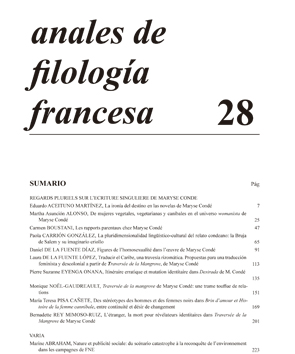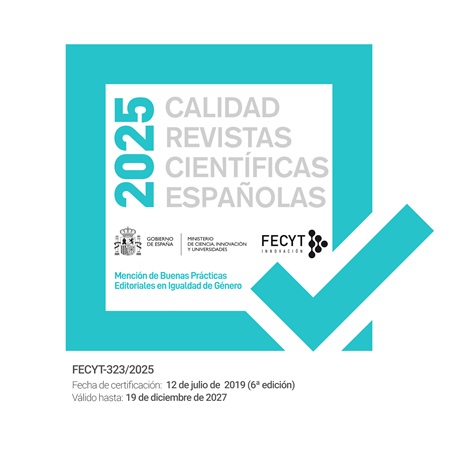Romantic fiction as a receptacle for meaningful anthroponyms in Alain Mabanckou
Supporting Agencies
- & Université Gaston Berger de Saint-Louis
Abstract
A novel constitutes a fully-fledged universe a product of a writer’s imagination. The characters representing some beings move to the core of this universe according to the modes of the fiction. The attributes that permit to reconstitute their portraits are suitable to various interpretations. These not only imply aesthetic considerations ( because the writer is first of all an artist ) , but also sociological and anthropological, insofar the literature would not be dissociated of the realities of the social and communal life. In fact, the name being the identical reference that first specifies the individual and distinguishes him/her of his/her fellow creatures, it is permissible to see to what point it is rich of implications and “talking” in the novels of Alain Mabanckou. Indeed ; the names of his characters define the people who carry them in the absolute. They suggest aspects oh their personality or influence their destiny. And for reason, to seize the senses of which they are invested brings non negligible lightings on the narrations that the congolese writer provides us with.
Downloads
-
Abstract404
-
PDF (Français )756
References
Références bibliographiques
ACHEBE, Chinua. Le monde s’effondre. 2000. Paris, Présence Africaine
ALEXANCRE, Pierre. 1983. “Sur quelques pratique d’onomastique africaine: toponymie, anthroponymie, ethnonymie” in Cahiers d’Études Africaines, n° 89, Vol. 23, 175-188.
BARTHES, Roland. 1964. “Rhétorique de l’imagesˮ in Communications, 40-51
BARTHES, Roland. 1972. Nouveaux essais critiques, Paris, Seuil.
BRA, Bosson. 2013. “Motivations onomastiques dans les œuvres Les naufragés de l’intelligence et La carte d’identité : Esthétique de la laideur morale et singularité romanesque chez Jean-Marie Addiaffi” in Éthiopiques, n° 91, http://ethiopiques.refer.sn/spip.php?page=imprimer-article&id_article=1882, consulté le 10 avril 2020.
BASSINTSA-BOUESSO, Aetius. 2018. “Imaginaire subsaharien et représentations de la figure du sorcier chez Alain Mabanckou” in Interfrancophonies, n° 9, 57-74
BISANSWA, Justin. 2011. “Petites sociologies de la déviance et des gradins sociaux chez Alain Mabanckou” in Revue de l’Université de Moncton. Vol. 42, n° 1-2, 2011, 19-49
DEVÉZA, Jean-Michel. 2012 “L’Afrique à l’identité sans passé d’Alain Mabanckou” in Afrique contemporaine, n° 241, 93-110
GASQUY-RESH, Yannick. 2001 Écrivains francophones du XXème siècle, Paris, Ellipse / AUF.
GUILLOREL, Hervé. 2012. « Onomastique, marqueur identitaire et plurilinguisme. Les enjeux politiques de la toponymie et de l’anthroponymie » in Droit & Culture, n° 64, 11-50.
GRUTMAN, Rainier. 2002. “Le bilinguismeˮ in Le dictionnaire du littéraire. Paris, PUF. 72-73
JOUVE, Vincent. 1992. L’effet-personnage dans le roman, Paris, PUF.
JOUVE, Vincent. 2001. La poétique du roman, Paris, Armand Colin.
KESTELOOT, Llyan. 2004. Histoire de la littérature négro-africaine. Paris, Karthala-AUF.
KRIPKE, Saul. 1982. La logique des noms propres, Paris, Éditions de Minuit.
LOPES, Henri. 1982. Le pleurer-rire, Paris, Présence Africaine.
MABANCKOU. Alain. 2002. Les petits-fils nègres de Vercingétorix. Paris, Le Serpent à Plumes.
MABANCKOU, Alain 2003. African psycho. Paris, Le Serpent à Plumes.
MABANCKOU, Alain.2005. Verre cassé. Paris, Seuil.
MABANCKOU, Alain. 2006. Mémoires de porc-épic. Paris, Seuil.
MABANCKOU, Alain. 2007. Lettre à Jimmy, Paris, Fayard.
MABANCKOU, Alain. 2012. Tais-toi et meurs. Paris, Éditions La Broche.
MABANCKOU, Alain. 2012. Le sanglot de l’homme noir. Paris, Fayard
MABANCKOU, Alain. 2013. Lumières de Pointe-Noire. Paris, Seuil.
MARQUES, Atonio J. S. “Histoire(s) de sobriquets : du populaire au littéraire” https://cvc.cervantes.es/lengua/paremia/pdf/002/025_souto.pdf consulté le 15 octobre 2017.
MAYIMONA, Alphonse. 1992. Le retour triomphal de Mossi. Abidjan, NEA.
NGOÏ-NGALLA, Dominique 1999. Congo-Brazzaville, le retour des ethnies, la violence identitaire. Abidjan, Imprimerie Multiprint.
NDINGA MBO, Abraham. 1988. “Brève histoire du Congo jusqu’à l’arrivée des Français” in Notre Librairie. n° 92-93, 1988, 40-43.
PAVLOVIC, Diane. 1987. “Du cryptogramme au nom réfléchi. Onomastique ducharmienne” in Études françaises. Vol 23, n° 3, 89-98. https://www.erudit.org/fr/revues/etudfr/1987-v23-n3-etudfr1058/035729ar.pdf, consulté le 14 avril 2020
PORTE, Danielle. 2013 Vercingétorix: celui qui fit trembler César. Paris, Ellipse Marketing.
PROUST, Marcel. 1929. Du côté de chez Swan. Paris, Gallimard.
TABA ODOUNGA, Didier. 2013. “La langue française comme vecteur des savoirs et d’axiologie chez Alain Mabanckouˮ in Regards sur la langue française au Congo. Paris, L’Harmattan.
TREPS, Marie. Z012. Le roman de la gloire : les sobriquets des politiques, Paris, Seuil.
Las obras que se publican en esta revista están sujetas a los siguientes términos:
1. El Servicio de Publicaciones de la Universidad de Murcia (la editorial) conserva los derechos patrimoniales (copyright) de las obras publicadas, y favorece y permite la reutilización de las mismas bajo la licencia de uso indicada en el punto 2.
2. Las obras se publican en la edición electrónica de la revista bajo una licencia Creative Commons Reconocimiento-NoComercial-SinObraDerivada 3.0 España (texto legal). Se pueden copiar, usar, difundir, transmitir y exponer públicamente, siempre que: i) se cite la autoría y la fuente original de su publicación (revista, editorial y URL de la obra); ii) no se usen para fines comerciales; iii) se mencione la existencia y especificaciones de esta licencia de uso.
3. Condiciones de auto-archivo. Se permite y se anima a los autores a difundir electrónicamente las versiones pre-print (versión antes de ser evaluada) y/o post-print (versión evaluada y aceptada para su publicación) de sus obras antes de su publicación, ya que favorece su circulación y difusión más temprana y con ello un posible aumento en su citación y alcance entre la comunidad académica. Color RoMEO: verde.











